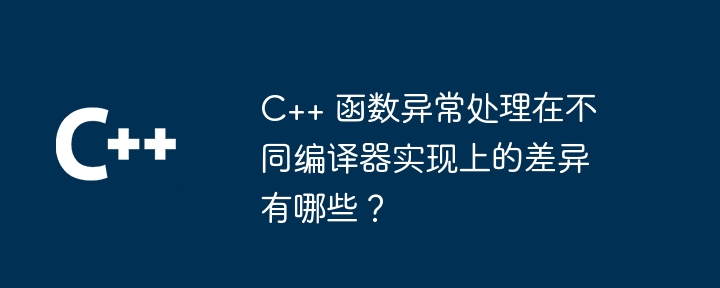
C Function exception handling differs in different compilers: exception throwing and catching: Most compilers use throw to throw exceptions and use try-catch blocks to catch them. GCC also supports the __attribute__((nothrow)) keyword to declare functions that do not throw exceptions. Exception types: Different compilers support different exception types. For example, MSVC supports MSVC exception types, and Clang and GCC support libstdc exception types. Exception information: Exceptions usually contain error information, which is stored in the what() member function in the libstdc implementation, while MSVC exceptions use the getMessage() member function to obtain the error message.

C Differences in function exception handling in different compiler implementations
In C, function exception handling provides a Methods for handling errors and exceptions when exceptions occur. However, there may be differences in the implementation of exception handling between compilers.
Exception throwing and catching
In most compilers, exceptions are thrown using the throw keyword and try- catch block catch. However, the GCC compiler also supports declaring functions that do not throw exceptions using the __attribute__((nothrow)) keyword.
Exception types
Different compilers may support different exception types. For example, Microsoft Visual C supports the MSVC exception type, while the Clang and GCC compilers support the libstdc exception type.
Exception information
Exceptions usually contain error information about the exception. In the libstdc implementation, exception messages are stored in the what() member function. MSVC exceptions use the getMessage() member function to get the error message.
Practical case
Consider the following code example:
#include <iostream>
using namespace std;
void divide(int numerator, int denominator) {
try {
int result = numerator / denominator;
cout << "Result: " << result << endl;
} catch (const exception& e) {
cout << "Error: " << e.what() << endl;
}
}
int main() {
divide(10, 2);
divide(10, 0);
return 0;
}GCC compiler
Compiled in GCC In the compiler, the code will throw an libstdc::invalid_argument exception and print the following output:
Result: 5 Error: division by zero
MSVC Compiler
Compiled in MSVC In the compiler, the code will throw a std::runtime_error exception and print the following output:
Result: 5 Error: Microsoft C++ exception
Conclusion
Compiled in different C In the processor, there may be differences in the implementation of exception handling, such as methods of throwing and catching exceptions, supported exception types, and how to obtain error information. Understanding these differences is critical to writing robust code in a multi-platform environment.
The above is the detailed content of What are the differences in C++ function exception handling in different compiler implementations?. For more information, please follow other related articles on the PHP Chinese website!
 What are the differences between c++ and c language
What are the differences between c++ and c language
 Recommended learning order for c++ and python
Recommended learning order for c++ and python
 Cost-effectiveness analysis of learning python and c++
Cost-effectiveness analysis of learning python and c++
 Is c language the same as c++?
Is c language the same as c++?
 Which is better to learn first, c language or c++?
Which is better to learn first, c language or c++?
 The difference and connection between c language and c++
The difference and connection between c language and c++
 C++ software Chinese change tutorial
C++ software Chinese change tutorial
 Cost-effectiveness analysis of learning python, java and c++
Cost-effectiveness analysis of learning python, java and c++




